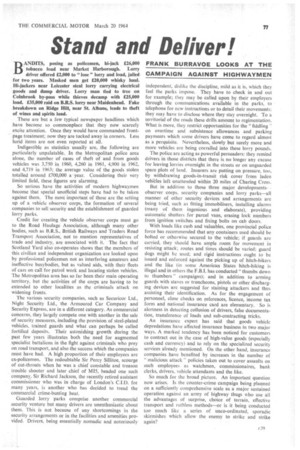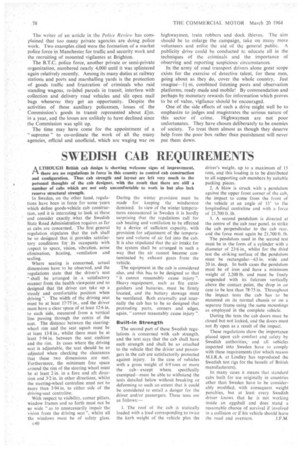Stand and Deliver!
Page 79

Page 80

If you've noticed an error in this article please click here to report it so we can fix it.
BANDITS, posing as policemen, hi-jack £26,000 tobacco load near Market Harborough. Lorry driver offered £2,000 to " lose " lorry and load, jailed .
• for two years. Masked men get £20,000 whisky haul. Hi-jackers near Leicester steal lorry carrying electrical goods and dump driver. Lorry man tied to tree on Colnbrook by-pass while thieves decamp with MAO load. £35,000 raid on B.R.S. lorry near Maidenhead. Fake breakdown on Ridge Hill, near St. Albans, leads to theft of wines and spirits load.
These are but a few typical newspaper headlines which have become so commonplace that they now scarcely excite attention. Once they would have commanded frontpage treatment; now they are tucked away in corners. Less lurid items are not even reported at all.
Indigestible as statistics usually are, the following are particularly unpalatable. In the Metropolitan police area alone, the number of cases of theft of and from goods vehicles was 3,750 in 1960, 4,260 in 1961, 4,900 in 1962, and 4,719 in 1963; the average value of the goods stolen totalled around £700,000 a . year. Considering their very limited field, these figures are alarming.
So serious have the activities of modernhighwaymen become that special unofficial steps have had to be taken against them. The most important of these are the setting up of a vehicle observer corps, the formation of several companies to sell security and the establishment of guarded lorry parks.
Credit for creating the vehicle observer corps must go to the Road Haulage Association, although many other bodies, such as B.R.S., British Railways and Traders Road Transport Association, not to mention representatives of trade and industry, are associated with it. The fact that Scotland Yard also co-operates shows that the members of this civilian and independent organization are looked upon by professional policemen not as interfering amateurs and ineffective busybodies, but as valued aids, with their fleets of cars on call for patrol work and locating stolen vehicles. The Metropolitan area has so far been their main operating territory, but the activities of the corps are having to be extended to other localities as the criminals attack on widening fronts.
The various security companies, such as Securicor Ltd., Night Security Ltd., the Armoured Car Company and Se urity Express, are in a different category. As commercial co; cerns, they largely compete one with another in the sale or security measures, including the provision of steel-plated vehicles, trained guards and what can perhaps be called fortified deposits. Their astonishing growth during the past few years illustrates both the need for augmented specialist battalions in the fight against criminals who prey on road transport, and also the success which the companies must have had. A high proportion of their employees are ex-policemen. The redoubtable Sir Percy Sillitoe, scourge of cut-throats when he was a chief constable and treason trouble shooter and later chief of MI5, headed one such company,. Sir Richard Jackson, the recently retired assistant commissioner who was in charge of London's C.I.D. fiat many years, is another who has decided to tread the commercial crime-busting beat.
Guarded _lorry parks comprise another commercial security venture but many drivers are unenthusiastic about them. This is not because of any shortcomings in the security arrangements or in the facilities and amenities provided. Drivers, being essentially nomadic and notoriously independent, dislike the discipline, mild as it is, which they feel the parks impose. They have to check in and out for example; they may be called upon by their employers through the communications available in the parks, to telephone for new instructions or to detail their movements; they may have to disclose where they stay overnight. To a territorial of the roads these drills amount to regimentation. What is more, they restrict opportunities for the "fiddling on overtime and subsistence allowances and parking payments which some drivers have come to regard almost as a perquisite. Nevertheless, slowly but surely more and more vehicles are being corralled into these lorry pounds.
The police are acting as powerful persuaders: they remind drivers in those districts that there is no longer any excuse for leaving lorries overnight in the streets or on unguarded spare plots of land. Insurers are putting on pressure, too, by withdrawing goods-in-transit risk cover from laden vehi"Cles left unattended within 20 miles of Charing Cross.
But in addition to those three major developments. observer corps, security companies and lorry parks—all manner of other security devices and arrangements are being tried, such as fitting immobilisers, installing alarms (many of them ingenious and elaborate), providing automatic shutters for parcel vans, erasing lock numbers from ignition switches and fixing bolts on cab doors.
With loads like cash and valuables, one provincial police force has recommended that any containers used should be bolted or otherwise secured to the vehicle; if guards are carried, they should have ample room for movement in resisting attack; routes and times should be varied; guard dogs might be used; and rigid instructions ought to be issued and enforced against the picking up of hitch-hikers and the like (in some American States hitch-hiking is illegal and in others the F.B.I. has conducted "thumbs down to thumbers " campaigns); and in addition to arming guards with staves or truncheons, pistols or other discharging devices are suggested for staining attackers and thus assisting their identification. As for the engagement of personnel, close checks on references, licence., income tax form and national insurance card are elementary. So is alertness in detecting collusion of drivers, false documentation, transference of loads and sub-contracting tricks.
An insurance expert has said that goods vehicle depredations have affected insurance business in two major ways. A marked tendency has been noticed for customers to contract out in the case of high-value goods (especially cash and currency) and to rely on the specialized security services already mentioned. On the other hand, insurance companies have benefited by increases in the number of " malicious attack" policies taken out to cover assaults on such employees as watchmen, commissionaires, bank clerks, drivers, vehicle attendants and the like.
So much for the broad picture. An important question now arises. Is the counter-crime campaign being planned on a sufficiently comprehensive scale as a major sustained operation against an army of highway thugs who use all the advantages of surprise, choice of terrain, effective transport and ruthless methods—or is it being conducted too much like a series of unco-ordinated, sporadic skirmishes which allow the enemy to strike and strike again? The writer of an article in the Police Review has complained that too many private agencies are doing police work. Two examples cited were the formation of a market police force in Manchester for traffic and security work and the recruiting of mounted vigilantes at Brighton.
The B.T.C. police force, another private or semi-private organization, numbered nearly 4,000 until it was splintered again relatively recently. Among its many duties at railway stations and ports and marshalling yards is the protection of goods traffic and frustration of criminals who raid standing wagons, re-label parcels in transit, interfere with collection and delivery road vehicles and slit open mail bags whenever they get an opportunity. Despite the activities of these auxiliary policemen, losses of the Commission's goods in transit represented about Elm. in a year, and the losses are unlikely to have declined since the Commission was split up.
The time may have come for the appointment of a " supremo " to co-ordinate the work of all the many agencies, official and unofficial, which are waging war on
highwaymen, train robbers and dock thieves. The aim should be to enlarge the campaign, take on many more volunteers and enlist the aid of the general public. A publicity drive could be conducted to educate all in the techniques of the criminals and the importance of observing and reporting suspicious circumstances.
In the army of road transport drivers alone great scope exists for the exercise of detective talent, for these men, going about as they do, cover the whole country. Just imagine-11 m. combined listening posts and observation platforms, ready made and mobile! By commendation and perhaps by mcinetary rewards for information which proves to be of value, vigilance should be encouraged.
One of the side effects of such a drive might well be to emphasize to judges and magistrates the serious nature of this sector of crime. Highwaymen are not poor unfortunates. They have chosen deliberately to be enemies of society. To treat them almost as though they deserve help from the poor box rather than punishment will never put them down.
















































































































































